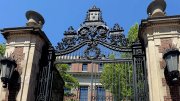On Wednesday, Harvard President Alan M. Garber and Provost John Manning announced that the University will allocate an additional $250 million to support campus research. These funds are coming from Harvard’s pool of central funds rather than its endowment, a University spokesperson said. Harvard already allocates about $500 million to research each year. This increase comes a month after the federal government announced that it would freeze $2.2 billion in grants to the University (allocated over several years), and two days after the federal Joint Task Force to Combat Antisemitism said it will terminate an additional $450 million in funding.
Throughout the semester, Harvard has prepared itself for the loss of federal funding. In March, the University announced a hiring freeze, and the Graduate School of Arts denied all applicants who had been placed on the waitlist for admission. In mid-April, Harvard borrowed $750 million of taxable debt through the bond market. In late April, Harvard sued the federal government a few days after the government announced the $2.2 billion funding freeze. And last week, Faculty of Arts and Sciences Dean Hopi Hoekstra announced the creation of a Research Continuity Committee to develop principles and a process for allocating research continuity funding.
In the community-wide email, Garber and Manning acknowledged that the additional funds would not make up for the lost federal funds. (In fiscal year 2024, the federal government funded about $700 million of Harvard research, non-federal sources such as private foundations contributed about $300 million, and Harvard provided about $500 million.) “Although we cannot absorb the entire cost of the suspended or canceled federal funds,” Garber and Manning wrote, “we will mobilize financial resources to support critical research activity for a transitional period as we continue to work with our researchers to identify alternative funding sources.”
Garber and Manning alluded to Harvard’s lawsuit against the federal government, framing the funding revocation as bigger than Harvard. “Although these actions were specifically targeted at Harvard, they are part of a broader campaign to revoke scientific research funding, which has included terminations of active awards at other institutions and a federal budget proposing steep cuts to National Institutes of Health funding and to National Science Foundation funding, among other measures. The impact of such steps on the nation’s scientific research enterprise could be severe and lasting. We will continue to fight the unlawful freeze and termination of our federal grants and to advocate for the productive partnership between the federal government and research universities that has for more than eighty years resulted in pathbreaking scientific discoveries, innovations, and advances in engineering, medicine, and public health.”
Read Garber and Manning’s full message here.









